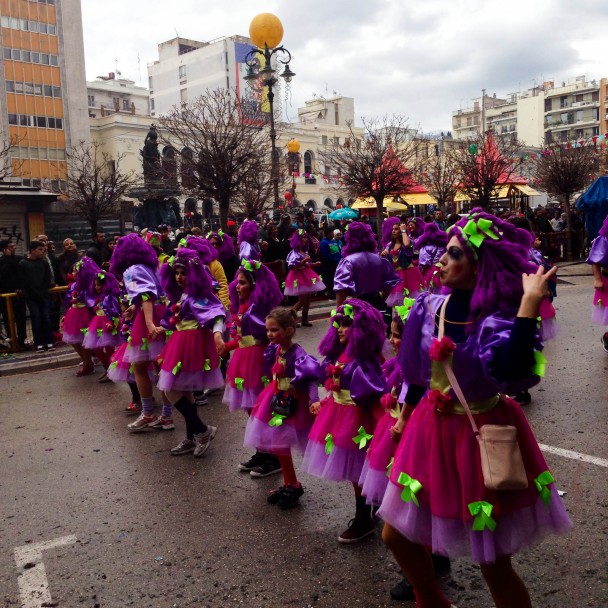He was the fourth person we asked for directions. I had already acquired more tiropitas than I could manage to stuff in my face, and my pockets were stripped of any spare change. He stood there in his chef’s cap, behind the rows of glazed tarts and rich chocolates. On the notepad, he drew a map. He only spoke Greek. I tried to speak Greek.
We took a right at the corner and walked for about 20 minutes, eventually circling back to where we had started. After three more passersby attempted to direct us, we finally made it to the terminal. Hundreds of people were waiting for their buses, and we had tickets for the 14:20 bus. Three and a half hours later, we were in Patras.
As I disembarked, the cold, rainy day gave way to a sensory collision. Jesters and brightly-clad families lined the streets. Bars and restaurants overflowed into the main alley. Street vendors sold feather boas, wigs, and headbands. It was a weekend of dancing, singing, and celebrating; the last weekend of Carnival, the predecessor to Clean Monday.
Living in a foreign country feels like you’re constantly spectating, observing, or looking in. As I walked toward the parade, I couldn’t help but think of the context in which this celebration was occurring: an economy gasping for air. I didn’t understand how, in a country where the unemployment percentage has been rising since 2010 and now rests in the mid-20s, thousands of Greeks were free enough of time and money constraints to celebrate.
Confused, I tried to reconcile the stark contrast. One of my first observations about living in Athens was the sense of community. With about three million people living in Athens metro, it’s no small town. Yet every morning, I, along with most Athenians, walk downstairs to the local bakery for bread. On Fridays, I travel to the neighborhood laiki, or farmer’s market. It’s a given that a taverna will give you a free appetizer or dessert. If you order one slice of baklava, you’ll get two.
This general sense of “what’s mine is yours” seems to contradict the status of the country’s economy. I am the furthest person from an economist, but it seems most logical to me that if you don’t have money, then you increase your prices and stop giving away freebies. “No wonder the economy is broken; everybody is giving things away for free,” people joke.
Maybe the prices here have gone up and I just don’t know it. All I know is that I can buy a massive gyro for two euros and eat a sprawling dinner at a taverna for about eight euros. So I don’t think that’s what’s going on.
A recent New York Times article describes the “social” economy in Greece. Producers are cutting out middlers, which means that they are no longer required to bribe for shelf space and that consumers have access to necessities at a more affordable rate. Savvas Mavromatis, a Greek business owner, told the New York Times, “even after six straight years of recession […] ‘people need to wash clothes, do their dishes and go to the bathroom.’”
It would be easy for me to follow this idea of a “social economy” with a discussion of capitalism and socialism, but I don’t think it’s necessary. When it comes to everyday living, what’s happening in Greece is not about politics or economic theory. It’s about surviving. And the only way to survive is to help out your neighbor, your cousin, or your patron.
In Athens, many storefronts remain empty. I don’t pretend to know what it’s like to be a Greek, but the Greeks have taught me something about life: there’s a point, perhaps we can call it “rock bottom,” where the only thing you can do is put on a costume and join the parade. The carnival, rooted in religion and centered on community, showed me what it means to be Greek. Whether I’m looking for directions or joining in the massive festivities, I’m not alone in this country.

Comments are closed